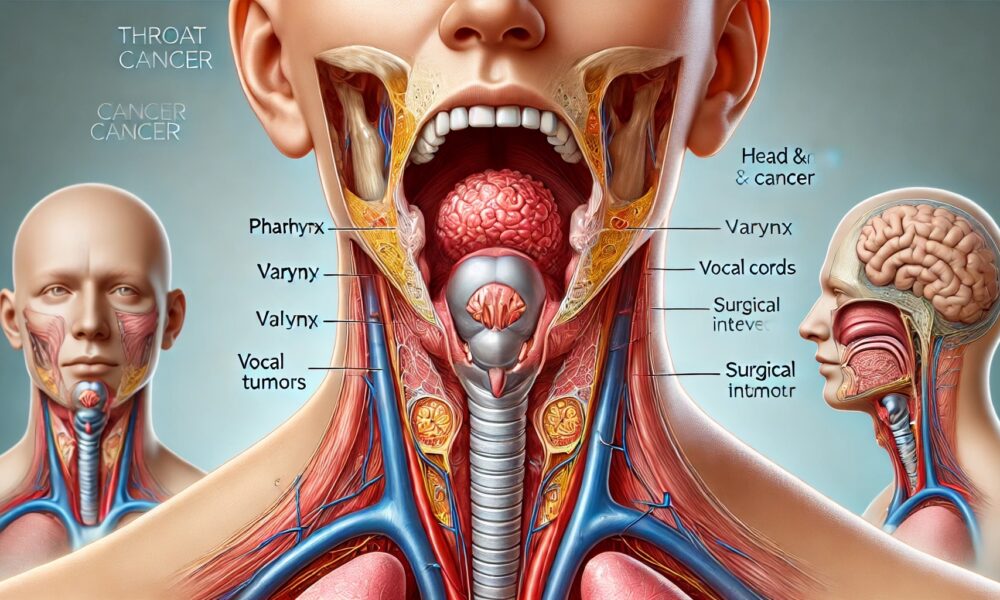Throat cancer refers to malignant tumors that develop in the pharynx (throat), larynx (voice box), or surrounding areas. Early detection and specialized care are crucial for effective treatment and improved outcomes.
Types of Throat Cancer
Throat cancer encompasses several specific types, including:
– Laryngeal Cancer
- Affects the larynx or voice box, leading to symptoms like hoarseness and breathing difficulties.
– Nasopharyngeal Cancer
- Occurs in the nasopharynx, the area behind the nose and above the back of the throat.
– Oropharyngeal Cancer
- Develops in the oropharynx, which includes parts of the throat just behind the mouth, including the tonsils and base of the tongue.
– Hypopharyngeal Cancer
- Affects the hypopharynx, the lower part of the throat surrounding the larynx.
Symptoms of Throat Cancer
Throat cancer symptoms can vary but commonly include:
Diagnostic Approaches
Accurate diagnosis involves a combination of:
01
Physical Examination
✔Assessment of the throat, neck, and lymph nodes.
02
Endoscopy & Biopsy
✔ Using a flexible tube with a camera to view the throat's interior.
✔ Removing a small tissue sample for laboratory analysis to confirm cancer presence.
✔ Removing a small tissue sample for laboratory analysis to confirm cancer presence.
03
Imaging Tests
✔ CT scans, MRI, and PET scans to determine the extent of cancer spread.
Risk Factors
Several factors can increase the risk of developing throat cancer, including:
- Tobacco Use: Smoking cigarettes, cigars, pipes, or using smokeless tobacco products.
- Excessive Alcohol Consumption: Regular and heavy intake of alcohol.
- Human Papillomavirus (HPV) Infection: Certain strains of HPV have been linked to throat cancers.
- Poor Nutrition: Diets lacking in essential vitamins and minerals.
- Exposure to Asbestos and Other Industrial Chemicals: Occupational hazards can contribute to risk.
- Gastroesophageal Reflux Disease (GERD): Chronic acid reflux may damage the lining of the throat.
Treatment Options
Treatment plans are tailored based on the cancer's type, stage, and patient's overall health. Common treatments include:
Surgery:
- Removal of the tumor and possibly some surrounding tissue. Minimally invasive techniques, such as robotic-assisted surgery, may be utilized for precision and quicker recovery.
Radiation Therapy:
- High-energy beams target and destroy cancer cells.
Chemotherapy:
- Drugs administered to kill or halt the growth of cancer cells, often used in conjunction with radiation.
Targeted Therapy:
- Medications that specifically attack cancer cell mechanisms.
Expert Care with Dr. Dushyant Mandlik
Dr. Dushyant Mandlik is a distinguished surgical oncologist specializing in the management of benign and malignant tumors in the head and neck region. His expertise encompasses:
Minimally Invasive Robotic Surgeries:
- Utilizing advanced robotic systems for precise tumor removal with reduced recovery times.
Comprehensive Head and Neck Cancer Management:
- Addressing cancers of the mouth, pharynx, larynx, sinuses, thyroid, parathyroid, and salivary glands.
Reconstructive Surgeries:
- Focusing on restoring function and appearance post-tumor removal to enhance patients’ quality of life.
For individuals experiencing symptoms or seeking specialized care for throat cancer, consulting with Dr. Mandlik ensures access to personalized and advanced treatment strategies.

